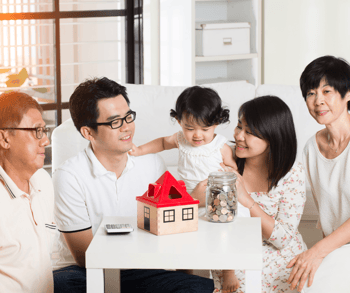 The purchase of your first home is one of the biggest steps you'll make in your entire life. The process can be a bit stressful, but it's also exciting. Buying a home is even more exciting if you're moving in with extended family; you'll have to adjust your housing needs but it's worth it to keep your family closer together.
The purchase of your first home is one of the biggest steps you'll make in your entire life. The process can be a bit stressful, but it's also exciting. Buying a home is even more exciting if you're moving in with extended family; you'll have to adjust your housing needs but it's worth it to keep your family closer together.
Having multiple people involved in the home buying process can make it significantly easier than trying to purchase a home on your own. More people means less cost per person, and older members of the family can provide valuable insight into the home buying process. Here are a few things to keep in mind during the purchase process.
1. Decide on a way to manage costs early.
Before you agree to move in with anyone, whether that is a roommate or a family member, you need to sit down and discuss costs. Is one person paying more than another in exchange for a larger room, or does everyone split the cost equally? Does the mortgage rotate month to month, or will the entire household share a bank account from which to pay the mortgage? These are decisions that have to be settled early and it's important that everyone has a clear understanding of mortgage payments.
2. Think about privacy.
Living with family can be great. You don't have to worry about making a long drive to visit your  relatives; you'll see them at the dinner table. That said, finding privacy in a large household can be difficult. One way to handle this is to have separate entrances for different sections of the home. Maybe your parents have a suite on one level of the house with their own entrance, so they can come and go without disturbing anyone else and maintain their privacy. Many of our new home plans can accommodate this.
relatives; you'll see them at the dinner table. That said, finding privacy in a large household can be difficult. One way to handle this is to have separate entrances for different sections of the home. Maybe your parents have a suite on one level of the house with their own entrance, so they can come and go without disturbing anyone else and maintain their privacy. Many of our new home plans can accommodate this.
3. Think about space.
When you're looking to purchase a home with your extended family, you'll need more space than you might in a normal home. According to studies, the average person needs around 400 square feet of space to feel comfortable. While this isn't as much of a consideration for children (young siblings can share a room), adults will need at least that much space.
Take the number of people in the home and multiply that by 400. You'll want a home with around that much square feet as a baseline. Additionally, one of the advantages of an open concept floor plan is comfortable, unrestricted space that doesn't even necessarily need to be huge in square footage.
4. Consider age-based needs.
Not only do you want to choose the best floor plan for your family, you want to ensure each component is functional for your situation. If you're living with older family members, they may have unique needs the rest of the family does not. For example, they may need a railing in the bathroom to help them stand up after using the toilet, or special non-slip flooring in the shower to prevent accidents.
If there are infants or toddlers in the home, then baby-safe locks may need to be placed in the kitchen and on the liquor cabinet or other areas you want to keep them away from. This may inconvenience other family members, but the situation should be discussed and understood by everyone living in the home.
5. Have routine family meetings.
Gathering the entire family into one room to discuss problems may sound like something straight out of a sitcom, but household communication is important, and even more so in homes with multiple generations residing together. As everyone knows, the youngest generation and the oldest generation have very different ideas of how things should be done, so it's important that each involved party be able to speak their mind and share their side of the story.
6. Establish ownership before signing anything.
Have a strong understanding of what it means to co-sign for a mortgage if that's the route you're going to take. You also want to think ahead. What happens if one of the parties involved in ownership of the property wants to move or passes away?
 Establishing ownership and inheritance can save you endless amounts of headache when a situation like that arises. The entire ownership agreement should be outlined thoroughly in the contract, and the person that inherits the responsibility of paying that share of the mortgage should also be clearly outlined.
Establishing ownership and inheritance can save you endless amounts of headache when a situation like that arises. The entire ownership agreement should be outlined thoroughly in the contract, and the person that inherits the responsibility of paying that share of the mortgage should also be clearly outlined.
7. Plan for financial trouble.
Purchasing a home for an extended family will, naturally, cost more than a single-family home. This can also mean more trouble if someone is suddenly unable to pay or to cover the costs. Plan for these situations ahead of time and decide what the other involved parties will do. You should also consider what to do if one of the involved family members has to declare bankruptcy or faces another sort of financial disaster.
Purchasing a home with your extended family can be a great way to save money and keep those familial bonds strong, but it can also pose its fair share of problems if you do not plan for eventualities ahead of time. Read over the seven items on this list and make your own plan of action to handle whatever problems may arise, and then enjoy knowing that your family is close and your wallet is a little bit heavier.





